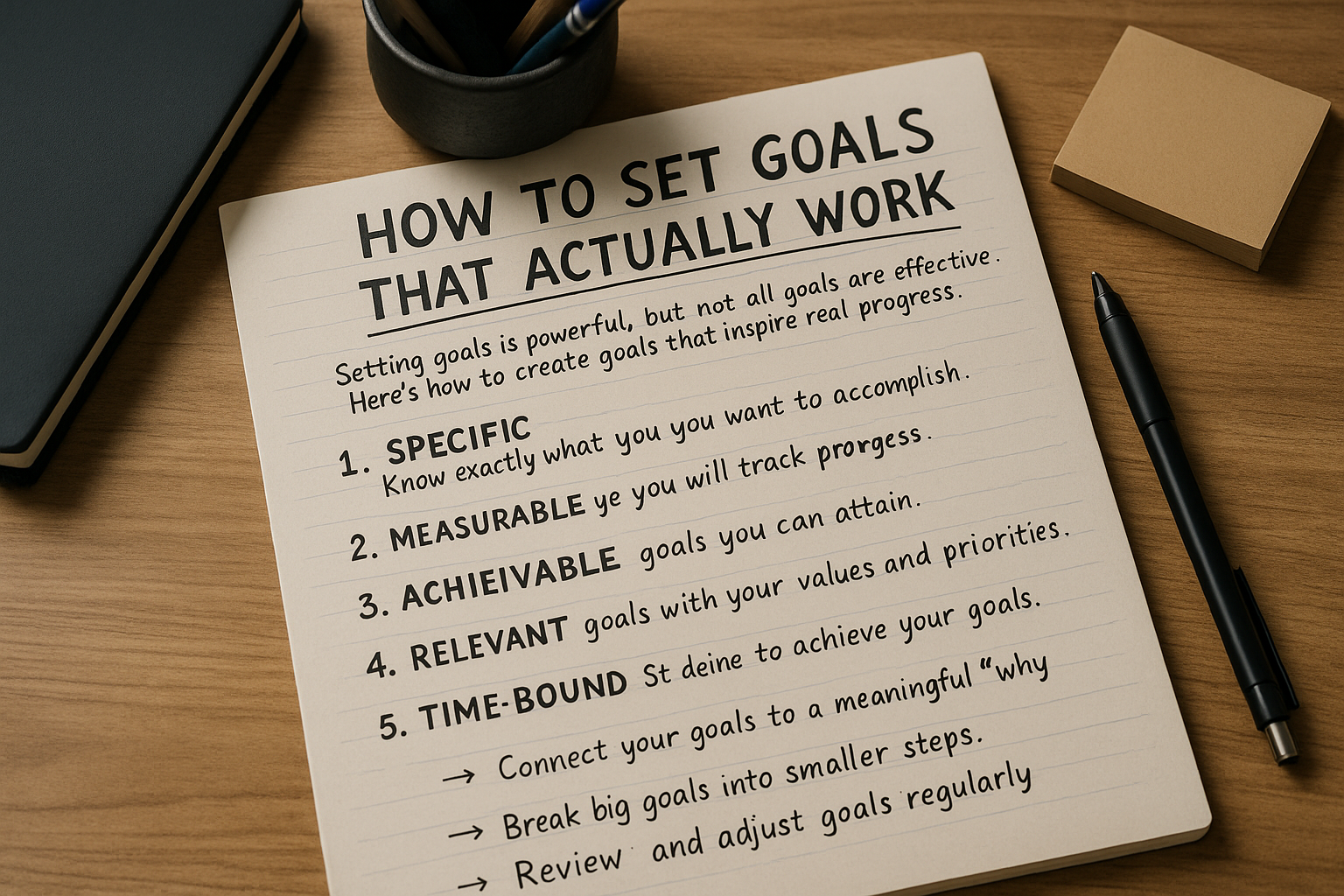Setting goals is one of the most powerful tools in personal development. Goals give us direction, motivation, and a sense of purpose. But here’s the catch: not all goals are created equal.
Many people set goals they never achieve—not because they lack discipline, but because the goals themselves are vague, unrealistic, or disconnected from what truly matters.
In this article, you’ll learn how to set goals that actually work—goals that inspire action, create clarity, and lead to real, lasting progress.
Why Most Goals Fail
Before we talk about what works, let’s address what doesn’t. Common reasons why goals fail:
- They’re too vague (“get in shape” or “be more productive”).
- They lack a clear plan or timeline.
- They’re based on what others expect, not personal values.
- They aim too high, too fast—leading to burnout.
- They focus only on the outcome, not the process.
Real goal-setting success comes from clarity, structure, and alignment.
The Power of SMART Goals
A proven framework for effective goals is the SMART method. SMART stands for:
- Specific
- Measurable
- Achievable
- Relevant
- Time-bound
Let’s break it down:
1. Specific
Vague goals create vague results. Be clear about what you want to achieve.
❌ “Be healthier”
✅ “Walk 30 minutes every weekday after work”
2. Measurable
Track your progress with metrics. It keeps you focused and motivated.
❌ “Read more books”
✅ “Read 1 book per month”
3. Achievable
Stretch yourself—but stay realistic. Goals should challenge, not overwhelm you.
❌ “Lose 30 pounds in two weeks”
✅ “Lose 5 pounds in the next month”
4. Relevant
Choose goals that align with your personal values and current priorities.
❌ “Learn to play violin” (if it’s not your passion)
✅ “Take a photography course to grow my creative skills”
5. Time-bound
Deadlines create urgency and structure.
❌ “Start a side business someday”
✅ “Launch my website by June 30th”
Connect Your Goals to Your “Why”
Goals that work have meaning behind them. Ask yourself:
- Why is this goal important to me?
- What will achieving it add to my life?
- How does it reflect who I want to become?
When your goals are tied to your purpose, it’s easier to stay motivated—even when it’s tough.
Break Big Goals into Smaller Steps
Big goals can feel overwhelming. Break them down into smaller milestones:
- Monthly
- Weekly
- Daily
For example:
Big goal: Write a book
Steps:
- Brainstorm topics (Week 1)
- Create an outline (Week 2)
- Write 500 words per day (Daily habit)
Each small win builds momentum and confidence.
Use Habit Stacking to Stay Consistent
Pair new goal-related habits with existing ones:
- After brushing your teeth → write your to-do list.
- After morning coffee → stretch for 10 minutes.
- After work → study for your online course.
This reduces friction and makes habits stick naturally.
Track Your Progress Visually
Tracking motivates and builds accountability. Try:
- A journal or planner
- A habit tracker app (like Habitica, Streaks, or Notion)
- A wall calendar with checkmarks
Seeing your progress reminds you that your efforts matter.
Review and Adjust Regularly
Life changes—and so should your goals. Once a week or month, ask:
- What’s working?
- What’s not?
- Do I need to adjust my timeline, priorities, or strategy?
This helps prevent burnout and keeps your progress sustainable.
Avoid These Goal-Setting Pitfalls
- Setting too many goals: Focus on 1–3 key goals at a time.
- Comparing your goals to others: Your path is yours alone.
- Waiting for motivation: Action often creates motivation.
- Focusing only on results: Enjoy and commit to the process.
Examples of Effective Goals
Here are a few SMART goal examples:
- “Exercise 3 times a week for 45 minutes until September.”
- “Save $2,000 in 6 months by cutting eating out to once per week.”
- “Meditate for 10 minutes every morning before work for 30 days.”
- “Learn basic Spanish by completing one Duolingo lesson per day for 60 days.”
Notice how each goal is specific, measurable, achievable, relevant, and time-bound.
Final Thoughts: Goals Are Promises to Your Future Self
Setting goals isn’t about adding pressure—it’s about creating structure for your dreams to thrive. When done right, goals help you become more focused, confident, and fulfilled.
Start with just one goal. Make it meaningful, make it clear, and take your first small step today.
Because the best way to predict your future… is to create it.
